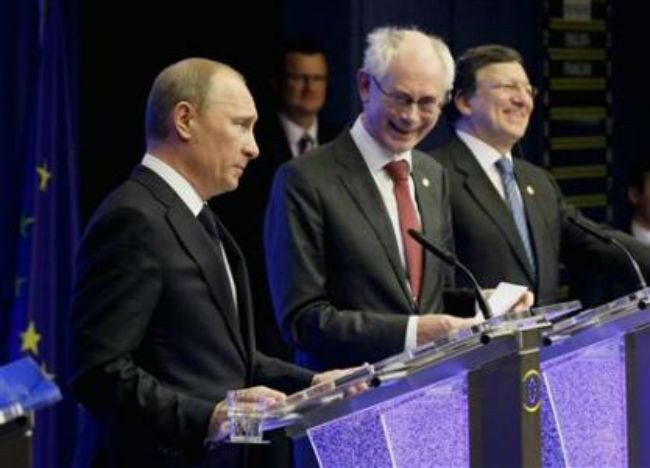
Russia's president and European Union leaders failed to narrow wide differences on Syria, immigration and a string of other issues at a summit on Friday marked by testy exchanges over their biggest bone of contention, energy policy.
At the close of hours of talks, European Commission President Jose Manuel Barroso gave President Vladimir Putin a public lecture defending the bloc's energy regulation, and the Russian leader responded by telling him he was "emotional" and "wrong".
Analysts had warned there was little chance the meeting - held on Putin's first visit to Brussels since his re-election in May - would make progress on the core issue of energy, which has long poisoned relations between the 27-nation bloc andRussia.
Russia is infuriated by EU efforts to liberalize its energy market and force dominant suppliers such as state-dominated Gazprom to sell off infrastructure to prevent them also controlling the distribution network.
Early on Friday, during the 30th in a long series of twice-yearly meetings, Putin referred to EU energy law as "uncivilized".
"Of course the EU has the right to take any decisions, but as I have mentioned ... we are stunned by the fact that this decision is given retroactive force," Putin said, referring to the fact the regulations apply to existing pipelines.
At the closing press conference, Barroso said the European Union was "respecting all international agreements and also the principles and rule of law".
Barroso declared the press conference finished but Putin called back the audience to make sure he had the last word.
Referring to Barroso as "my good old friend", Putin said "he is so emotional because he knows he is wrong".
MUTUAL DEPENDENCE
Europe relies on Russia, which sits on the world's biggest gas reserves, for around a quarter of itsnatural gas needs.
Over the last decade, a series of disputes between Moscow and its ex-Soviet neighbors - Ukraine and Belarus - have disrupted its gas exports. The disruption increased the EU's resolve to diversify supply away from Russia.
For its part, Russia has been busy building pipelines to bypass Ukraine as a transit nation, while pushing Kiev to cede control of its gas pipeline network.
On Thursday, Putin criticized Ukraine for failing to strike a compromise deal over gas supplies.
In a show of support for Ukraine, the European Commission chose the day of the EU-Russia summit to announce it was giving an extra 68 million euros ($90 million) to Ukraine, including 45 million to reform its energy market.
While energy is the most sensitive issue for Russia, a long list of other grievances includes simmering trade disputes, European Union criticism of its attitude towards civil liberties and travel visas.
Russia is also at odds with Western powers over the conflict in Syria, which has killed more than 40,000 people since an uprising against President Bashar al-Assad began in March 2011.
Putin said that to reach a "durable arrangement" in Syria, agreement was needed first on how to protect the interests of all religious and ethnic groups. "Everyone is interested in stopping the bloodshed and violence," he said.
On the subject of travel visas, Putin complained Russia was being unfairly treated compared with other nations.
"I have a long list of states here with me which have a visa-free regime with the EU. There isVenezuela, Honduras, Mauritius, Mexico, seems everyone else is there," Putin said.
Putin was greeted on arrival at the summit by four topless women, protesting against civil rights curbs in Russia and shouting "Putin, go to hell". They were bundled away by police.
© Thomson Reuters.




